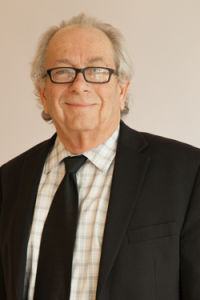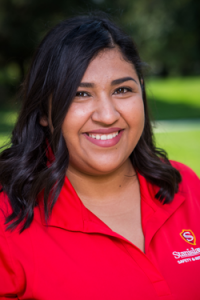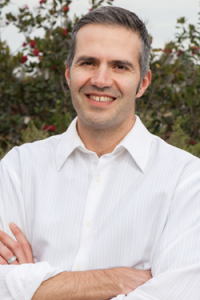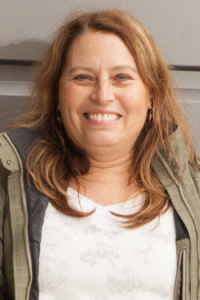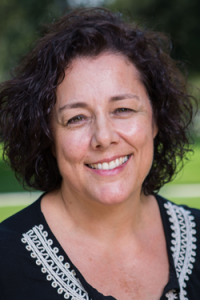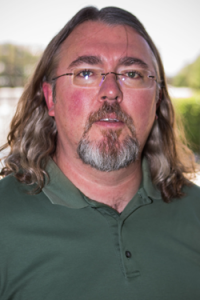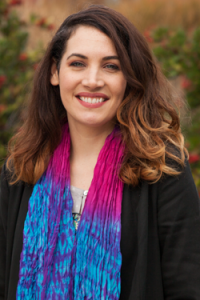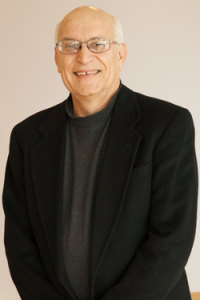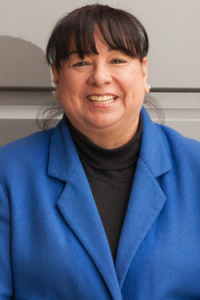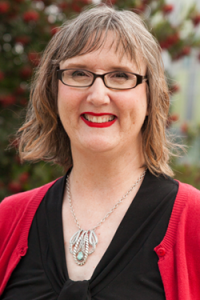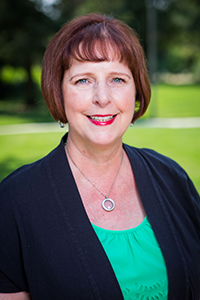Faculty & Staff Stories
Read the motivational stories from first-generation faculty and staff at Stanislaus State.
Professor, Advanced Studies in Education
“I was frightened. I was in my comfort zone at Turlock High and before that at Chatom Elementary. So, coming here in 1968, even though there were only 1,200 students and only two buildings on campus, I thought I was moving into the big leagues academically. I really enjoyed it. I loved it more than high school and it was a great time to be in college. I had great professors, the classes were just as small as they are now and I got a great education. I came back for my master’s and went on to be a teacher and school administrator elsewhere, then came back here 22 years ago.”
“I’m impressed with all of my students. They’re all graduate-level and they’re all teachers and counselors already employed as educators in the region — they’re the cream of the crop.”
“I’ve enjoyed every minute of this. I grew up on a dairy outside of Turlock and I didn’t want to milk cows all my life. I wanted to be a teacher since I was in high school, and within five years of graduating from high school I was teaching sixth grade.”
Campus Continuity Coordinator, Safety and Risk Management
The first couple of days I was just stoked to be here. I went to Merced College first, but my goal was always to attend Stan State. It was really cool for me.”
“It was hard. In all of my family no one had gone to college. My older sister went first and she was my model because I didn’t know anything about it. I did see that for some of the students in my classes college did seem to be a little easier, and I always thought that was because they had role-models in their home with their parents having gone to college. For me, it was really sink or swim.”
“My mom told us that we were going to go to college. The funding wasn’t there, but college always was the goal. She was a single mom of five, so things were tough but it was always in our mind that we had to go to college.”
Associate Professor, Psychology
“I started at a community college that was a branch of New Mexico State.”
“I didn’t feel a lot of culture shock. My junior college was so small and there were so many people from my high school there that it felt like an extension. It was when I first went to the University of New Mexico that I felt a little overwhelmed. I was living in the dorms and away from home for the first time — just trying to figure out where to go and what to do. I didn’t notice any first-generation gap until the end of my undergraduate years. People began to talk about graduate school and I literally had no idea what that was. I thought that I wanted to go on to get a Ph.D., but I didn’t know what it was called.”
“I remember one student who was in one of my large classes and she emailed me about where to find the book. It seemed like such a strange question, but she didn’t know about the bookstore and she expected that books would be handed-out like in high school.”
“I recognize the lack of role models in their lives, and I can relate to that. At the same time, I don’t think there’s much of an advantage to not being a first-generation student. It’s all a matter of guidance and understanding.”
“President Sheley had the tradition of always asking the first-generation graduates to stand during commencement, and it choked me up every time. I think sometimes in the details of our everyday life we forget about such things, but it’s very nice to see the impact Stan State has on the region.”
Professor, Communication Studies
“During my first year of college, I felt very alone and unsure of what I was doing. I struggled in classes thinking I wasn’t smart enough to be in college. I failed two exams in political science because I couldn’t figure out how to take an exam. I studied constantly and I knew the material but couldn’t pass the tests. I passed the course with a C-minus. I didn’t question how I passed the course but was grateful. I failed a business course and asked the teacher not to fail me. I cried in front of him. I couldn’t help myself. I was devastated that I’d be kicked out of college. I told the teacher that I’d change my major from business to sociology. He agreed to pass me as long as I didn’t stay a business major. I was glad to leave accounting behind me.”
“I’m lucky to teach personal and professional communication courses in which students can take away nuggets to use immediately in their relationships. I know what it’s like to struggle to understand instructions or assignments or how to pass exams. We have to learn how to learn and how to demonstrate learning.”
Professor, Sociology
“As a first-generation student, I had to overcome feelings of being an imposter. I often felt like I didn’t really belong in college and maybe wasn’t good enough.”
“As a professor, I see first-generation students having to overcome financial hardship — often working multiple jobs while going to school. Also, they often have family who really want them to succeed and want to support them but don’t have the resources or know how to help them. So, the first-gen student can feel alone and unsupported.”
“Every first-gen student is different, but I think most feel they have to work harder and feel more stress than non-first gen students since they don’t have the knowledge or support from family members who have already gone through it. I understand this stress and try to step in and give them some extra support whenever I can. But what I’ve seen from many first-generation students is that the family feels a sense of pride and a sense of achieving ‘The American Dream’ through their children’s successes.”
Assistant Professor, Biological Sciences
“As a first-generation student, there was a lot of stumbling around and trial and error for me. But most of the people at my school seemed to be at the same level of awareness and enthusiasm.”
“My parents were very encouraging and supportive. I saw myself becoming a teacher, although there was no way my parents were going to be able to pay for it. I got good grades. The only thing they said about college is that I could do anything I wanted, but once I started something I had to finish. More than anything else, that was the message that stuck. I could make my own choices, but it was on me to follow through. There was no option of starting, then quitting.”
“Among my current first-generation students, I see enthusiasm and a desire to be in a better place later in life after they get their degrees. That’s a common to what I experienced myself 25 years ago. There’s a desire to succeed and most students realize they’re fortunate to have an opportunity to be here.”
Assistant Professor, Sociology
“I felt academically prepared but socially and institutionally unprepared. I did it all on my own. My parents instilled the value of a college education in me. Both of them went to college but dropped out after the first year, and I think they realized the importance of college because they always regretted that they didn’t finish. So from day one, my parents invested a lot of time in marketing college to me. They built it up for me in my mind and I don’t think a lot of first-generation students get that particular dialogue at home.”
“Once I got to college, I didn’t have any navigational help. I got financial aid only because a guidance counselor grabbed me and told me I was eligible. I drove myself to college preview days, figuring out all of that on my own. My first day on campus was exciting because I always wanted to be an adult, and there I was being an adult. But I had a lot of friends who had parents holding their hands every step of the way while I was figuring everything out on my own. Everybody wants their child to be independent. Paternal help is nice, but the doors won’t shut if they don’t help. You do have to figure things out on your own. College was a swimming pool and I had to jump into the deep end alone while other kids got the chance to wade to the deep end.”
“The biggest shock teaching at Stan State was that I didn’t realize how personally rewarding it would be. A lot of my friends went off to teach at schools where they have many privileged students who take so much for granted. We get so much appreciation here from our students. Last time I checked, only 14 percent of the people in our county have a bachelor’s degree, which is incredibly low. I don’t need the students to come back and thank me for anything, because I know that the region is a better place because they stayed and got their degree. It makes me feel like I make a difference, which sometimes is hard to see in other jobs.”
Chair, Department of Teacher Education
“I didn’t feel out of place in my first days in college, but the hardest thing for me was knowing what to do. I didn’t have anybody to show me anything, such as needing to go to the bookstore to buy books because they don’t give them out in class. I had cousins who encouraged me to go to college because my parents certainly were not doing that.”
“I don’t know that’s it’s easy for me to look out into the classroom and spot a first-generation student, but it’s in my heart to root for the underdog, for the person who is trying to succeed despite maybe being a little inhibited or afraid to speak-up. I always seek in my class to give a voice and to encourage those students to become active in the classroom.”
“I’m from the field of education, so we’re in the business of making dreams happen. I try to spot students with talent and get them to think about a master’s degree. For me, getting a bachelor’s was a big deal and it took somebody to tell me that I should be thinking about a master’s. Sometimes it takes a mentor. What we do so well at Stanislaus State is educate those kids, to bring them along, graduate them and give them dreams to go on. It’s what makes me so proud to work here.”
Professor, Liberal Studies
I am 1 of 10 siblings, and as an older sister I was responsible for the caretaking of my younger siblings. My parents and grandparents were immigrant seasonal farm workers. Because I was the first to graduate in the history of my entire family tree, the largest hurdle to overcome was receiving educational support to achieve a high school diploma and higher education. My job as an older daughter was to help raise the siblings and when old enough to work, give my paycheck to my parents to help with the family living expenses. School was never a priority in my family.”
“I see some of the same challenges that I had seeking higher education in some of my students today. Trying to find a balance between family, work, personal life, school work, navigating the day to day demands of administrative paperwork and basic knowledge of the educational system was always a struggle. I see first-generation students who lack the ability of knowing what to expect, what questions to ask, who to ask or the lack of educational collateral to succeed. “
“My educational experience included a faculty mentor, who took personal interest in my educational aspirations, my personal family life, my success as a student and later as a colleague. Now, I can be a mentor to first-gen students or I can refer them to another colleague who is willing to mentor a first-gen student.”
Associate Professor, Sociology
“I was a non-traditional student, a late-bloomer. I went to my local community college in Ontario, Oregon at 26 and everybody wanted to help me. I had tutors and guides. Then I transferred to the University of Oregon with 25,000 students and my first week there I packed all of my stuff up to go home. I was alone and there was no one there to help me. I got some help and they got me into EOP and other programs to provide tutoring and guidance.”
“I took a class in Latin because I thought I would need it if I wanted to go to law school, but no one told me that they assumed their students already had taken three years of Latin, or three years of another language in high school. No one told me or showed me how to get a scholarship, and even in grad school I didn’t know I could apply for grants.”
“A few people did help me get to grad school, but I felt like an immigrant — it was a foreign land. I didn’t understand how to navigate the bureaucracy. If somebody doesn’t tell you how to do it, you don’t know. I tell my students today that nobody gives you a secret decoder ring that tells you what college life means.”
Tutoring Center
"The boys in my family were expected to attend college. The girls - not so much. When it became clear to me and my husband how much I wanted this degree, I jumped in feet-first with his full support. The accomplishment wasn't just that I had gotten my degree, but that I had done it on a non-traditional path and had fun in the process."
"I intended to go to college right out of high school, but I found a full-time job and with rent, car payment and other expenses, school went by the wayside. I got married at 20 and it would be more than 10 year before I decided to go to school. I was working on campus and I saw people come in and graduate, and finally I figured out I had better get busy. I took one class at a time and finally, 15 years after I started classes, I graduated Magna Cum Laude.
"College is hard - don't let anyone tell you it's not. But if it was easy, EVERYONE would do it - it just depends on how badly you want to succeed. Don't overload yourself with classes - not everyone can finish in four or five years - slow and steady wins the race. These may sound like clichés but it doesn't matter WHEN you graduate, it matters THAT you graduate! Sometimes our dreams just take a little longer to come true."
Updated: June 27, 2023
